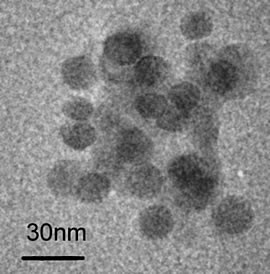Oct 14 2008
Physics Professor Diandra Leslie-Pelecky brought more with her when she arrived at UT Dallas than expertise in nanotechnology and shiny behemoth lab equipment. She brought an award for $84,000 from the National Institutes of Health via the Cleveland Clinic.
 Iron nanoparticles made in Professor Diandra Leslie-Pelecky’s lab are spherical and uniformly sized, a highly desired goal in producing nanoparticles.
Iron nanoparticles made in Professor Diandra Leslie-Pelecky’s lab are spherical and uniformly sized, a highly desired goal in producing nanoparticles.
Formerly a professor at the University of Nebraska-Lincoln, Leslie-Pelecky forged a partnership with the clinic’s Dr. Vinod Labhasetwar in the Department of Biomedical Engineering. They partnered to pursue cancer treatments that “stick” treated magnetic nanoparticles (MNPs) of iron oxide to tumors using magnets outside the body.
“This avenue of research focuses on treatments for breast cancer and prostate cancer,” Leslie-Pelecky said. “These cancers usually present tumors that are close to the skin. If we can deliver magnetic, cancer-fighting drugs directly to these tumors—and if we can keep the drugs in place at the tumor sites with magnets—we can avoid some of the side-effects of giving people cancer drugs that end up distributed through their entire body.”
Leslie-Pelecky said the basic principles of this treatment are established, but a few roadblocks remain.
“One challenge is making nanoparticles that are more magnetic,” she said. “We really have to understand the basic physics at work so we can design strongly magnetic nanoparticles. We’re fighting blood flow that will carry treatments away from tumors, so we need stronger magnetic nanoparticles that will stay in place, and keep the chemotherapy drugs in place, when we hold a magnet on the outside of the skin.”
Another possible roadblock the research team faced was determining whether iron-oxide nanoparticles presented any harmful effects inside the body. The study concluded that the MNPs generated didn’t cause long-term changes in liver enzyme levels or induce oxidative stress and were therefore safe for drug delivery or other applications.
Leslie-Pelecky custom tailors iron oxide nanoparticles in a stainless steel deposition chamber housed in her lab at UT Dallas. Labhasetwar supplies the medical expertise for their collaboration, while Leslie-Pelecky focuses on magnetic nanotechnology and precisely manufacturing the research particles.
The collaboration resulted in a paper, published in Molecular Pharmaceutics, that was recently cited among the most-accessed articles in the first quarter of 2008.